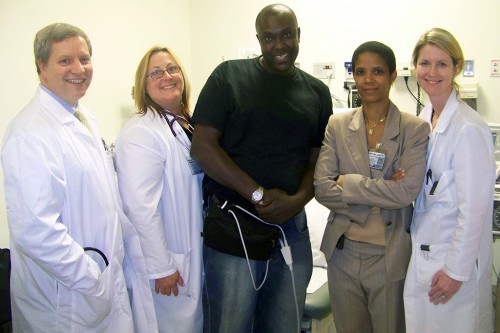STONY BROOK VENTRICULAR ASSIST DEVICE PROGRAM FOR “DESTINATION THERAPY” EARNS NATIONAL ACCREDITATION FROM THE JOINT COMMISSION
First and only program on Long Island to achieve accreditation after rigorous two-day review
STONY BROOK, NY, March 7, 2011 — The ventricular assist device (VAD) program of the Stony Brook Heart Center — the first and only VAD program on Long Island that provides "destination therapy" — just received national accreditation from the Joint Commission after an intensive two-day review by a team of Joint Commission surveyors.
The inspection of the VAD program occurred Feb. 28 and March 1. The program's "certification of distinction" is for a two-year period, with a performance review at the end of the first year.
"Accreditation is a seal of approval that signals to our patients that they are in a quality program and are in capable hands when they come to Stony Brook," said Todd K. Rosengart, MD, co-director of the Heart Center, and professor and chairman of surgery and chief of cardiothoracic surgery at Stony Brook University Medical Center.
"This is an outstanding achievement reflecting on a total team commitment to providing quality care to patients requiring ventricular assist devices for destination therapy," said Margaret Duffy, MS, RN, NEA-BC, associate director of nursing for cardiac services at Stony Brook University Medical Center.

Destination therapy">Destination therapy uses VAD technology as the final treatment option for select patients whose hearts require mechanical assistance to pump blood. Once used as a temporary device for heart failure patients awaiting transplants, new VAD technology now helps more patients extend and improve their quality of life.
To achieve accreditation, VAD programs are evaluated on standards in the Joint Commission's Disease-Specific Care Certification Manual. Programs must demonstrate conformity with clinical practice guidelines or evidence-based practices. They are also required to collect and analyze data on at least four performance measures related to clinical practice guidelines until more standardized performance measures are identified.
Accredited programs must also:
- Provide VAD destination therapy to an adult population
- Have facilities with the infrastructure to support VAD placement, including adequate staffing and facilities to perform and recover patients after cardiac surgery
- Be an active continuous member of a national, audited registry for mechanically-assisted circulatory support devices that requires submission of health data on ventricular assist device destination therapy patients from the date of implantation throughout the remainder of their lives
- Include a board-certified cardiac surgeon who has placed 10 VADs in the last 36 months with current activity in the last 12 months
Providing Destination Therapy
Allison J. McLarty, MD, associate professor of surgery, continues to lead Stony Brook's program in destination therapy, which provides an alternative to heart transplant. She is now treating a growing number of patients who have congestive heart failure with implantation of the newly developed left ventricular assist device (LVAD) called HeartMate II.
In April 2010, Dr. McLarty accomplished the first permanent LVAD implantation on Long Island, making headlines for her success with this important new advance in patient care.
The HeartMate II, just approved by the FDA in February 2010 as a permanent implant, consists of a surgically implanted pump attached to an external power source that can be portable and worn on a shoulder strap or belt. The pump takes over the work of the heart's left chamber that's become severely weakened as a result of congestive heart failure.
Unlike earlier LVADs that were designed for temporary use, the HeartMate II is for permanent use. This LVAD engineering represents a new generation of "artificial heart" technology that provides end-stage heart failure patients with access to an important new treatment option.
Studies show a significant improvement in quality of life with the HeartMate II compared to conventional medical treatment.
Dr. McLarty co-directs Stony Brook's VAD program with cardiologist Hal Skopicki, MD, assistant professor of medicine, who serves as medical director.
